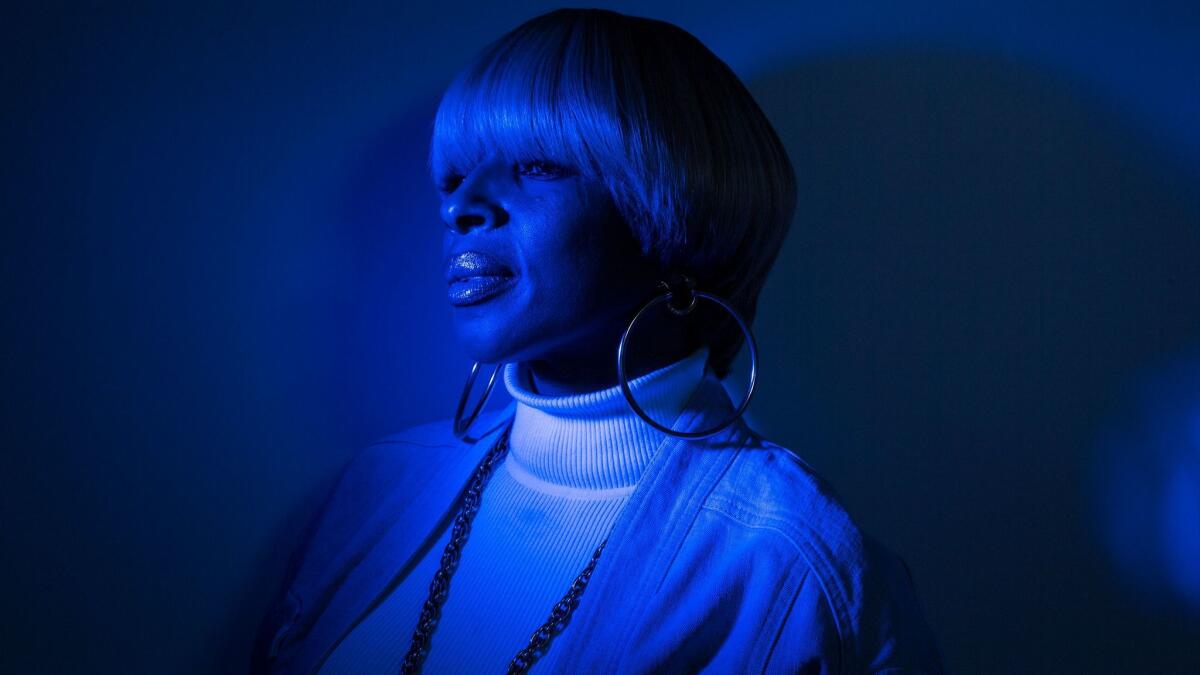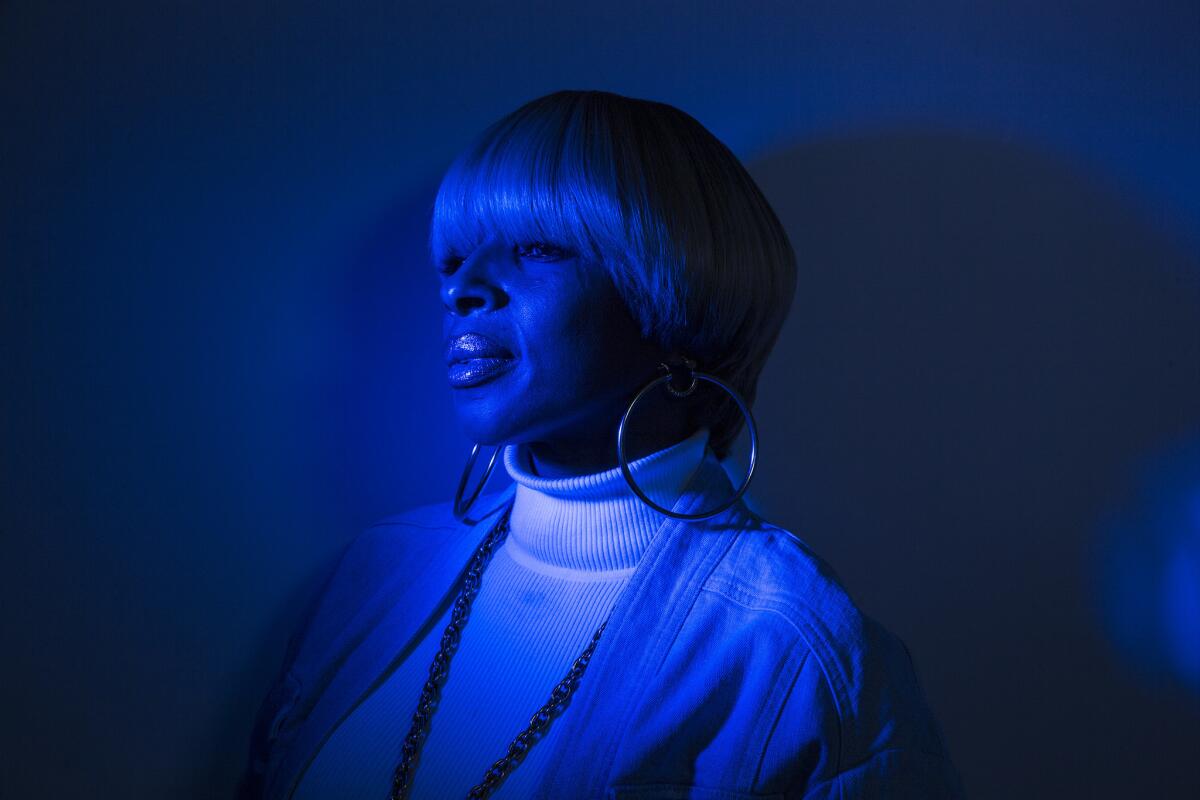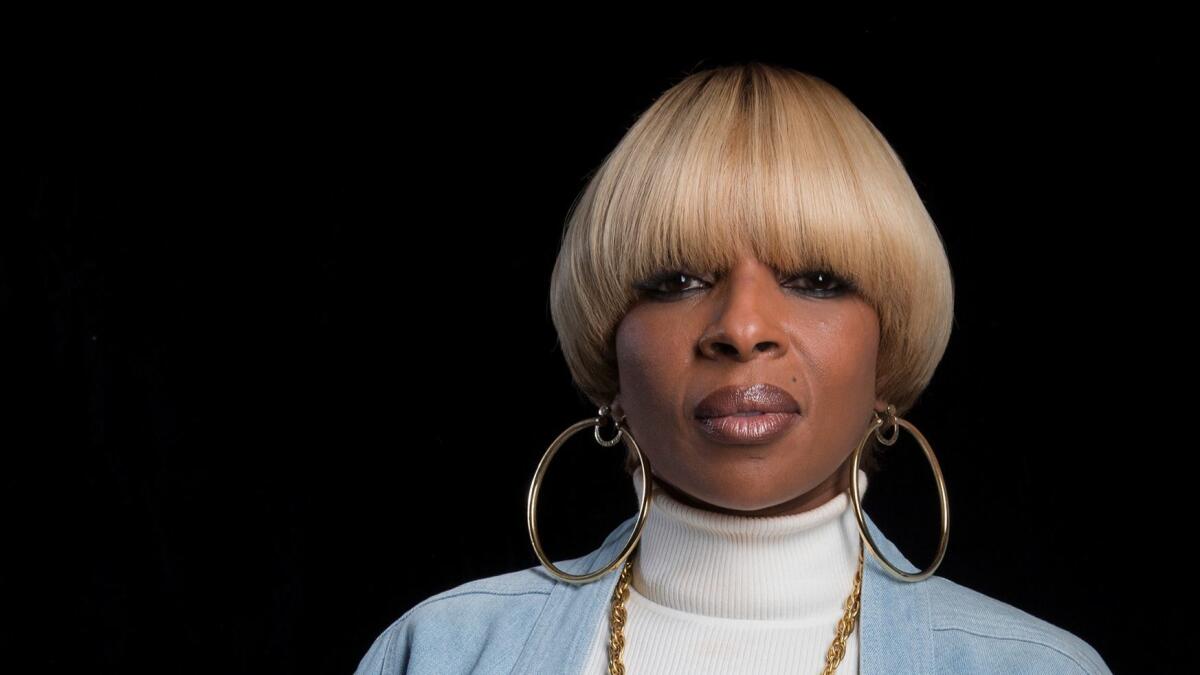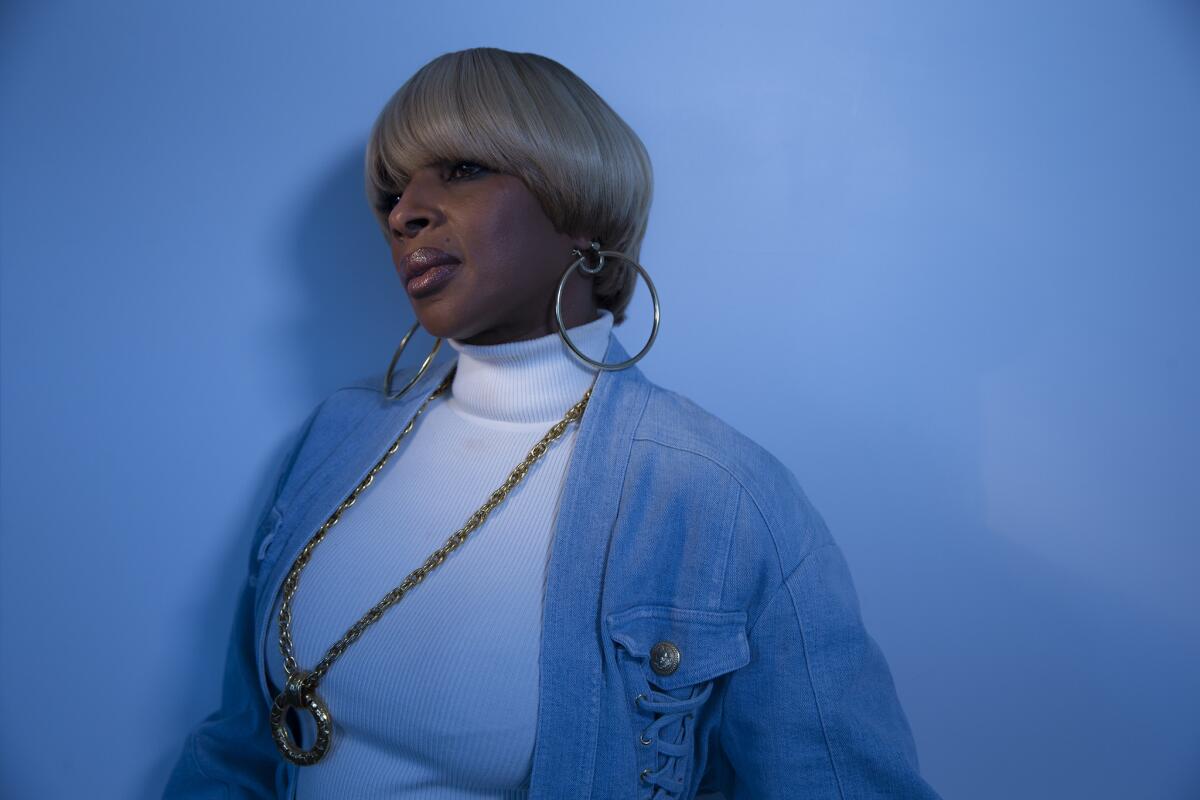Mary J. Blige might not be drama free at the moment â and sheâs OK with that


For Mary J. Blige, thereâs always been purpose in pain.
A hard upbringing marred by violence. Heartbreak. Addiction. Toxic relationships. Self-hatred.
Regardless of the source, Blige has made it her ministry to navigate the depths of despair and confront emotional trauma through her music â and she always keeps it real, no matter how ugly things get.
Itâs that search for catharsis that has made her one of the most influential R&B singers of her time.
Bligeâs fusion of gospel-inflected singing and hard-knocking beats helped redefine R&B when she debuted 25 years ago. Ultimately, she became branded the âQueen of Hip-Hop Soul,â and she has collected Grammys in R&B, gospel, rap and pop.
Sheâs been the therapist, the reverend and the wise sister-friend to millions whoâve turned to her soul-baring songs of sorrow, resilience and empowerment for personal healing.
The mission of her music is steadfast: âItâs OK to not be OK â just don't stay there. Keep pushing.â
Her new album, âStrength of a Woman,â has arrived at a time when sheâs facing one of lifeâs challenges: divorce.
In true Blige fashion, sheâs channeled the drama into her music and the album â a blistering collection of betrayal, heartbreak, self-love, faith and survival.
During a conversation on the eve of her albumâs release, her first since 2014âs âThe London Sessions,â a work in which she collaborated with British soul and dance acts, Bligeâs weariness was heavy. Never one to mince words, she doesnât hold back when discussing personal or professional drama. âThatâs life,â she says, letting out a deep sigh.

It was surprising to hear you were in a place where you didnât want to record.
Really not wanting to do anything anymore. âThe London Sessionsâ gave me the confidence. It inspired me again, because it let me know I was still appreciated. When I went overseas [to record the album], I was super weak and not feeling good. I was feeling like giving up because it was so much coming down on me. The bad press. Other [stuff] that was going on. It was just so much, on top of me suffering inside of my own marriage that nobody even knew about.
No one knew?
Exactly. But it gave me the push to say, âIf you can survive all of this, and then some, you are a strong woman." I wanted to do another album for my core fans to see I survived it. I made âThe London Sessionsâ because I needed a break from the United States. I thought people were done with me. That's all I kept hearing from parties around me, and of course the negative chatter coming from him. My fans are tired of me, this and that. That trip to London, it let me know that I was really a strong individual.
The new album had been in the works for two years. When did its direction change?
The beautiful thing about it was [that] when I went into the album, I was fighting for my marriage. I was speaking from that perspective. There's songs on the album that were different. I loved my husband, and I wanted to keep him. Lyrics didn't change until what happened happened. When everything got exposed, it was like, "What am I to do now?â I can't put this album out. I had to go back in the studio with all of that and rewrite songs.
Some songs stayed the same, like âSurvivorâ and âIndestructible.â âThick of Itâ was one of the biggest, most powerful love songs on the album because it was saying how we just don't give up when we're in the thick of it â but he had already given up, and so the song changed. âIt's Meâ is a song I wrote in the marriage when I was feeling like something was going on. And so it became an air out.
How tough does it get for you in the studio, putting everything out there like that?
It's hard, but it's good. It's all therapeutic. As bad as it feels in my stomach and in my heart, I'm no longer suffering inside that situation. Now I can speak about it. I can deliver it. I can get it off of me. Then, when I sing it in concert, I don't mind reliving it. I'm connecting with my fans.
Finding strength amid conflict
After the first half of her career was spent crafting albums that exposed her seemingly endless personal turmoil and made her R&B royalty, Blige was on the brink of collapse. The singer struggled with substance abuse and clinical depression, and her love life was in tabloid-baiting tumult. Blige hit rock bottom â "I knew at some point I was going to die,â she told me years ago â before turning to her faith.
She exorcised those demons on 2001âs âNo More Drama.â She found love, marrying record executive Kendu Isaacs in 2003, with him assuming the role of manager. She often credited him as a saving force, and as the singer felt healthier and happier, her music got brighter â often to the chagrin of fans dissatisfied with âHappy Mary.â
After 2005âs triumphant, Grammy-winning âThe Breakthrough,â subsequent records were met with growing disinterest by her core base. Radio appeared to lose interest too.
She also found herself at the center of seemingly never-ending bad press. A 2012 Burger King advertisement where she sang about fried chicken was seen as pandering to a racist black stereotype, and Blige was met with widespread scorn (it was swiftly pulled). And the licks kept coming. Her charity, FFAWN, was accused of financial impropriety, her own finances became gossip fodder and her Beats 1 radio show, âReal Talk,â was met with ridicule when the singer discussed racism and police brutality with Hillary Clinton during an episode in which she sang directly to the presidential candidate.
Frustrations with her career and personal life sent her overseas for 2014âs âThe London Sessionsâ to reevaluate things. She was reenergized by collaborating with acts such as Disclosure, Naughty Boy, Emeli SandĂŠ and Sam Smith. Although critically viewed as one of her stronger releases, it was largely overlooked. That it came months after her poorly promoted âThink Like a Man Too,â it left many, Blige included, wondering if she had lost it.
As bad as it feels in my stomach and in my heart, I'm no longer suffering inside that situation. Now I can speak about it.
â Mary J. Blige on her divorce

The last few albums didnât connect with listeners.
What I think was happening is my fans were confused with my emotion. I couldn't tell them that I was suffering. And if I did, they wouldn't believe me, because they saw me still in the marriage. I think people were confused as to what was going on.
Professionally, things have been tough for quite some time. Is there anything youâd do different?
You know, it all boils down to me taking responsibility for my own career and not trusting people with it. Or making decisions for me. I didn't know the Burger King commercial was going to turn into âshe's singing about chicken.â
The backlash was immediate.
Yeah. People were coming like bees in a swarm. I'd never seen so much hatred come from a career mistake. Then right after that it was the FFAWN fraud and all the [stuff] that went down with that. It had nothing to do with me, but my name is on everything. Taxes, this and that. It was one thing after the next. It was all so negative. None of it was no understanding for me being a human being. At that moment, I was like, "This is a wake-up call."
Everybody was scattering, including [my husband/manager], and left me by myself. That let me know, âOK, Iâve got to really learn how to take care of Mary.â
What have you learned from doing your Beats radio show?
That I'm able to do it. I didn't even know I was able to do it.
Really?
When I did the Hillary Clinton interview, I was scared to death, but I needed to do that. I needed to know my confidence would allow me to do that. I was never able to give a proper interview. I'm always bungling and stumbling because of my insecurities of not being able to articulate myself properly. Just not [feeling] smart enough. When I did that, I realized that I was smarter than I thought I was and smarter than what people were saying. I just had to stop doubting myself and listening to people and go for it.
When you sang to Mrs. Clinton during the interview, it became a meme. People certainly felt a way.
It didn't bother me as much as all the rest, because I had already been through hell. This was like âWhatever.â Moving right along, because I know what I did in the interview. It may not be what you like, and somebody took a piece of the thing where I was singing and put it out there. It was a small part of something great that I had accomplished, that I was proud of.
No more drama
When Blige split with her husband and manager of 13 years, there was palpable excitement for new music. Sheâs very aware that many were anticipating this moment. The albums where sheâs most wounded have been salve for her fans.
âStrength of a Womanâ is no doubt a divorce record. There was no other choice, as her relationshipâs unraveling played out very publicly. The day she sat for this interview, a slew of gossip blogs alleged the source of the split was her husbandâs affair with her own protegĂŠ.
Blige doesnât shy away from the hard stuff on the new album.
âAre you worth this fight? Are we worth this fight?â she questions on âThick of It.â On the album standout, âIndestructible,â her instruction to âthink about how valuable you areâ is sung with such intensity that itâs clear sheâs talking more to herself than any of her fans.

Thereâs a lot of talk about how this album is âClassic Mary.â For many, the news that you had drama made them excited for the new album. Has the idea of people being over âHappy Maryâ ever upset you?
I can't be angry at them, because misery is all they know. I don't say that in a negative way. If you know something else, you want something else â happiness, peace, confidence. So you want that from me. If they knew that, they would want that for me. I want to see them rise up and move on with me. But youâve got to respect where people are. It has nothing to do with me. I have to keep moving.
I'm in pain and hurting and all that stuff, but there's light at the end of the tunnel. This [stuff] hurts ⌠and it hurts too bad to be hurting and know better. I know better. I know there's love somewhere for me. I'm not going to give up on love.
Youâve said you felt alone in the marriage for years. Why did you stay, and when did you stop trying to make it work?
I stayed. I confronted. I'm not the type not to confront. I tried to make it work, but you just get deception and lies and lies and lies. You believe something is going to change or someone is going to change, and they can win an Academy Award with how they just lie straight up to your face and you believe it for so long.
I did everything, and I was like, âOK, maybe this is what marriage is about.â
Was there a part of you, though, that was trying to please the public by upholding this image of happiness?
Not for my marriage. I wanted to be what he wanted me to be, which is a good wife. Which is the woman he was always talking about he wanted, that knew how to have a conversation and how to cook or how to do this or do that. I was trying in the marriage to learn ⌠because I really wanted to be with him.
The public? I don't [care]. If I'm in danger, the public can't stop me from being like, "I'm out of here." The public is one thing, and they're beautiful to have, but they're not going to stop me from getting out of my marriage. When it was time, when I saw I wasn't enough, I wasn't enough. I wasn't the woman that [he] wanted. I still didn't know how to have a conversation. I still wasn't pretty enough.
That's tough to hear.
It is what it is.
What does happiness look like for you, and how do you work on maintaining whatever that definition is for you?
Happiness for me is peace of mind. Being at peace with myself, at peace with God, at peace with my family. Financially being OK, because finances do play a big part in this â not the biggest part, but it's a part. How I treat people is a big part in happiness, because how you treat people is how you will be treated in the end. And walking in love. I'm not going to beat myself up about things. I just want happiness.
For more music news follow me on Twitter:@GerrickKennedy
The biggest entertainment stories
Get our big stories about Hollywood, film, television, music, arts, culture and more right in your inbox as soon as they publish.
You may occasionally receive promotional content from the Los Angeles Times.








